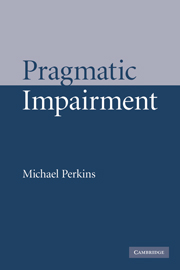Book contents
- Frontmatter
- Contents
- List of figures
- List of tables
- Acknowledgements
- Transcription conventions
- 1 Introduction
- 2 Pragmatic theory and pragmatic impairment
- 3 Pragmatics and modularity: components, dissociations and associations
- 4 Pragmatic ability and disability: an emergentist model
- 5 Cognition and pragmatics
- 6 Language and pragmatics
- 7 Sensorimotor systems and pragmatics
- 8 Compensatory adaptation
- 9 Conclusions
- Appendix
- References
- Index
3 - Pragmatics and modularity: components, dissociations and associations
Published online by Cambridge University Press: 22 September 2009
- Frontmatter
- Contents
- List of figures
- List of tables
- Acknowledgements
- Transcription conventions
- 1 Introduction
- 2 Pragmatic theory and pragmatic impairment
- 3 Pragmatics and modularity: components, dissociations and associations
- 4 Pragmatic ability and disability: an emergentist model
- 5 Cognition and pragmatics
- 6 Language and pragmatics
- 7 Sensorimotor systems and pragmatics
- 8 Compensatory adaptation
- 9 Conclusions
- Appendix
- References
- Index
Summary
Introduction
It was concluded in Chapter 2 that, in order for pragmatics to be a useful concept for clinicians, it needs to be specified at least in part in terms of its various underlying contributory factors. But what are these factors, and how should we conceptualize them? Can they be grouped in such a way as to constitute a single overarching entity, or are they so disparate and diverse that no coherent notion of pragmatics is possible? In this chapter I will focus on some of the cognitive and linguistic bases of pragmatics and will consider whether pragmatics itself can be construed as a discrete component of the mind, as has been intimated by some pragmatic theorists. Drawing on language pathology research, I will then examine how far the individual cognitive and linguistic dysfunctions which are seen as giving rise to pragmatic impairment may themselves be regarded as distinct mental entities, and how they relate both to each other and to the pragmatic behaviours that they engender. This will involve an examination of what has become known as the ‘modularity of mind’ debate. Any account of human communication which sees the role of cognition as integral – whether it be in relation to pragmatics, semantics, syntax or some other feature – would appear obliged to take a view on whether or not some or all aspects of cognitive processing are inherently modular.
- Type
- Chapter
- Information
- Pragmatic Impairment , pp. 33 - 50Publisher: Cambridge University PressPrint publication year: 2007



